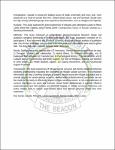Attempted Suicide: Lived Experiences of Refugees in Rhino Camp, West Nile Uganda
Abstract
Introduction: Suicide is among the leading source of death universally and every year, more
people die as a result of suicide than HIV, malaria breast cancer, war and homicide. Sucide rates
are high among vulnerable groups who experience discrimination, such as refugees and migrants.
Purpose: This study explored the lived experiences of refugees who attempted suicide in Rhino
Camp, West Nile, Uganda, using Thomas Joiner’s Interpersonal Theory of Suicide Attempts as a
theoretical framework.
Methods: This study employed an interpretative phenomenological Research design and
purposive sampling techniques to choose participants, the study population consisted of 15
participants (7 Key Informants and 8 Suicide Survivors) to ensure in-depth analysis of qualitative
data. Face to face interviews using in depth interview guide and observations were used to gather
data. The study data were collected between June - July 2023.
Result: Data saturation was reached after 13th interviews. Thirteen themes emerged from the data:
1) Domestic Violence and relationship, 2) mental illness, 3) Financial difficulties, and 4)
Inadequate food deliveries 5) Traumatic past, 6) Psychological distress, 7) Social isolation, and 8)
Cultural stigma, 9) Community and family support, 10) Role of Religious, Cultural, and Opinion
or other leaders, 11) Health facilities support, 12) Coping mechanisms, and 13) Psychosocial
Support Providers.
Conclusions: The lived experiences of refugee suicide survivors and themes identified enhanced
scholarly understanding regarding the experience of refugee suicide survivors. This important
information can help us develop strategies to prevent suicide among the refugee population and to
provide support for suicide attempt survivors. Mental health professional and counsellors can use
the results of this study to effectively support refugee suicide survivors. A rich comprehension of
survivor experience can assist and empower mental health professionals to provide, effective
psychoeducation and interventions and informed support to suicide survivors. Clinicians and
policy makers need to remain open-minded about how attempt survivors might view their
experience.
Key words: Suicide, Refugees, Lived experiences, Mental Health, Rhino Camp

